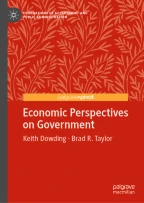Markets, Market Failure and the Role of Government

This chapter introduces Pareto efficiency as the key normative concept of welfare economics and describes the conditions under which we expect efficiency or market failure. We pay particular attention to the existence of externalities and show how these can, but do not always, cause markets to fail. Whenever there is market failure it is conceptually possible for government to intervene in order to improve outcomes. Government failure also occurs, however, and so such intervention is not always practical. When considering imperfect alternatives, we must engage in comparative institutional analysis.
This is a preview of subscription content, log in via an institution to check access.
Access this chapter
Subscribe and save
Springer+ Basic
€32.70 /Month
Buy Now
Price includes VAT (France)
eBook EUR 42.79 Price includes VAT (France)
Hardcover Book EUR 52.74 Price includes VAT (France)
Tax calculation will be finalised at checkout
Purchases are for personal use only
Notes
In the standard analysis, the tax is levied on the production of the good itself. As Plott (1966) points out, the tax should instead be levied on the output of the externality (i.e. the pollution) or on the resource which causes the pollution. This provides the right incentives for firms to change their production process to remove externalities rather than simply reducing production. Since it does not alter the central points we wish to make in this chapter, we will use the simpler case of taxes imposed on the output of a good.
Inframarginal externalities can in some cases be inefficient in the sense that net benefits would be increased by moving from equilibrium to a much smaller or greater level of output, even though marginal changes would cause inefficiency (Buchanan and Stubblebine 1962: 374).
References
- Akerlof, G. A. (1970). The market for ‘lemons’: Quality uncertainty and the market mechanism. Quarterly Journal of Economics,84, 488–500. ArticleGoogle Scholar
- Alchian, A. A. (1950). Uncertainty, evolution, and economic theory. Journal of Political Economy,58, 211–221. ArticleGoogle Scholar
- Booth, P. (2008). Market failure: A failed paradigm. Economic Affairs,28, 72–74. ArticleGoogle Scholar
- Buchanan, J. M., & Stubblebine, W. C. (1962). Externality. Economica,29, 371–384. ArticleGoogle Scholar
- Cheung, S. N. (1973). The fable of the bees: An economic investigation. Journal of Law and Economics,16, 11–33. ArticleGoogle Scholar
- Coase, R. H. (1937). The nature of the firm. Economica,4, 386–405. ArticleGoogle Scholar
- Coase, R. H. (1960). The problem of social cost. Journal of Law and Economics,3, 1–44. ArticleGoogle Scholar
- Coase, R. H. (1992). The institutional structure of production. American Economic Review,82, 713–719. Google Scholar
- Colander, D. (2007). Retrospectives: Edgeworth’s hedonimeter and the quest to measure utility. Journal of Economic Perspectives,21, 215–226. ArticleGoogle Scholar
- Demsetz, H. (1969). Information and efficiency: Another viewpoint. Journal of Law and Economics,12, 1–22. ArticleGoogle Scholar
- Friedman, D. D. (1990). Price theory: An intermediate text (2nd ed.). Cincinnati: South-Western University Press. Google Scholar
- Friedman, M. (1953). The methodology of positive economics. In Essays in positive economics (pp. 3–47). Chicago: University of Chicago Press. Google Scholar
- Hayek, F. A. (1945). The use of knowledge in society. American Economic Review,35, 519–530. Google Scholar
- Hayek, F. A. (1948). The meaning of competition. In Individualism and economic order (pp. 92–106). Chicago: University of Chicago Press. Google Scholar
- Hicks, J. R. (1939). The foundations of welfare economics. Economic Journal,49, 696–712. ArticleGoogle Scholar
- Kaldor, N. (1939). Welfare propositions of economics and interpersonal comparisons of utility. Economic Journal,49, 549–552. ArticleGoogle Scholar
- Keech, W. R., & Munger, M. C. (2015). The anatomy of government failure. Public Choice,164, 1–42. ArticleGoogle Scholar
- Meade, J. E. (1952). External economies and diseconomies in a competitive situation. Economic Journal,62, 54–67. ArticleGoogle Scholar
- Munger, M. C. (2011). Euvoluntary or not, exchange is just. Social Philosophy and Policy,28, 192–211. ArticleGoogle Scholar
- Okun, A. M. (2015). Equality and efficiency: The big tradeoff. Washington, DC: Brookings Institution Press. Google Scholar
- Pareto, V. (1906). Manuale di economia politica. Milan: Società Editrice Libraria. Google Scholar
- Pigou, A. (1920). The economics of welfare. London: Macmillan. Google Scholar
- Plott, C. R. (1966). Externalities and corrective taxes. Economica,33, 84–87. ArticleGoogle Scholar
- Schumpeter, J. A. (1934). The theory of economic development: An inquiry into profits, capital, credit, interest, and the business cycle. Cambridge, MA: Harvard University Press. Google Scholar
- Smith, A. (1776). An inquiry into the nature and causes of the wealth of nation. Oxford: Clarendon Press. BookGoogle Scholar
- Spence, M. (1973). Job market signaling. Quarterly Journal of Economics,87, 355–374. ArticleGoogle Scholar
- Stigler, G. J. (1961). The economics of information. Journal of Political Economy,69, 213–225. ArticleGoogle Scholar
Author information
Authors and Affiliations
- School of Politics and International Relations, Australian National University, Canberra, ACT, Australia Keith Dowding
- School of Commerce, University of Southern Queensland, Springfield, QLD, Australia Brad R. Taylor
- Keith Dowding

